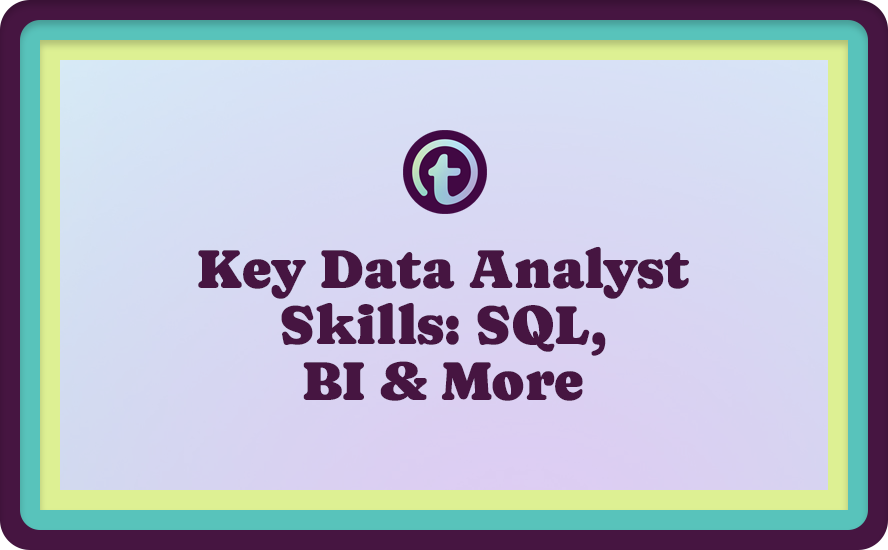The collection, analysis, and interpretation of key data points is integral to success in web development, and skilled data analysts fill that role for tech companies around the globe. When you look to hire data analysts for your team, it is important that you find individuals who have the right skills to help you accomplish your goals — but what skills do data analysts need to have?
Data analysts perform a variety of tasks for tech companies — including collecting and cleaning important data, analyzing the data and interpreting what it means for your company, providing visual interpretations of the data, collaborating with developers, and providing data-based insights. These tasks mean that data analysts need to have a diverse set of skills that include experience with Structured Query Language (SQL), Business Intelligence (BI), database management, statistical analysis, and more — and Truss can help you find remote data analysts with these essential skills.
Contact the Truss Team today for more information on our global hiring platform!
READ MORE: How To Vet and Hire a Data Analyst
Top 6 Essential Skills for Data Analysts
What skills do data analysts need to have to succeed? What skills do your web development projects require? Data analysis can cover a lot of ground, making it important for you to define the skills that are needed to accomplish your goals. We want to help you find the perfect fit for your tech company at Truss, and this list of Top 6 Essential Skills for Data Analysts will provide you with a basic checklist for potential data analyst candidates.
Here is a list of essential skills that data analysts need to have to succeed that include technical and soft skills:
1. Experience with SQL
Structured Query Language (SQL) is a primary tool for data analysts and the primary programming language used in data analysis. In-depth knowledge of SQL means that data analysts can perform a variety of data-related tasks across a range of platforms. SQL programming is used for data retrieval, data manipulation, data management, data validation, and data collection.
2. Experience with Business Intelligence Tools
Business Intelligence (BI) tools are a key element in software applications that are used to collect, process, and analyze data from a variety of sources that allow you to make data-informed decisions and construct data reports with visual elements and dashboards. Favorite BI tools include Microsoft Power BI, Tableau, Looker, and Qlik that highlight Key Performance Indicators (KPIs) for your tech company.
3. In-Depth Knowledge of Programming Languages
Programming and code are used for much more than software development. Data analysts use programming languages to collect, analyze, interpret, and create visual reports of key data. A qualified data analyst needs to have experience and knowledge of key programming languages used in data analysis that include SQL, Python, R, Julia, Scala, VBA, Java, and JavaScript.
4. Skill with Statistical Analysis

Statistical analysis is about much more than just analyzing key data points, it involves collecting, analyzing, interpreting, and presenting the data in a way that allows developers and company owners to discover patterns, trends, and relationships within the data. Statistical analysis typically employs a systematic approach to the data with eight key steps — create a hypothesis, collect the data, explore the data, choose a method to research your hypothesis, conduct an in-depth analysis, analyze and interpret the results, provide data-based recommendations, and prove your findings.
5. Ability to Problem Solve and Think Critically
Analysis of key web data will uncover complex and complicated patterns that require a critical approach. Data analysts need to have the ability to problem solve and think critically at every point of the data analysis process. This soft skillset is essential for data analysts to have and gives them the ability to define hidden errors, uncover in-depth insights, evaluate the quality of the data, find quality solutions, and be objective and accurate when they present their findings and analysis.
6. Be Adaptable and Eager to Learn
Like we mentioned above — data analysis can cover a lot of ground when it comes to software and web development. This means that data analysts need to be able to quickly adapt to new information, new technology, and new methods to achieve their goals. A data analyst that has the basic skills needed, is eager to learn, and quick to adapt will be better equipped to uncover hidden data insights and provide high-quality analysis that will drive success.
READ MORE: How To Build a Remote Data Analyst Dream Team
Find Remote Data Analysts in Central Asia with Truss
You may not know where to look or where to find data analysts with the skills that your company needs. You may not find individuals that fit your company in your own area. Truss can help you find remote talent with key data analyst skills that include SQL, BI, and more with our global hiring platform.
Truss has decades of experience finding, recruiting, hiring, and managing remote tech talent in Central Asia and other regions across the globe. We provide U.S.-based tech companies with a global hiring platform, where we take your needs and specifications into account, and use those guidelines to create a list of qualified candidates that may fit your needs. We will find potential candidates in emerging markets like Uzbekistan, Kazakhstan, Georgia, Poland, and more, where you will find a deeper talent pool and lower employment costs. When you have found the right fit, Truss will help onboard and manage your remote team, and we will function as your Employer of Record to ensure you remain compliant with local employment laws.
Contact Truss today to learn more about how our global hiring platform can help you find the right fit for your team and succeed!

